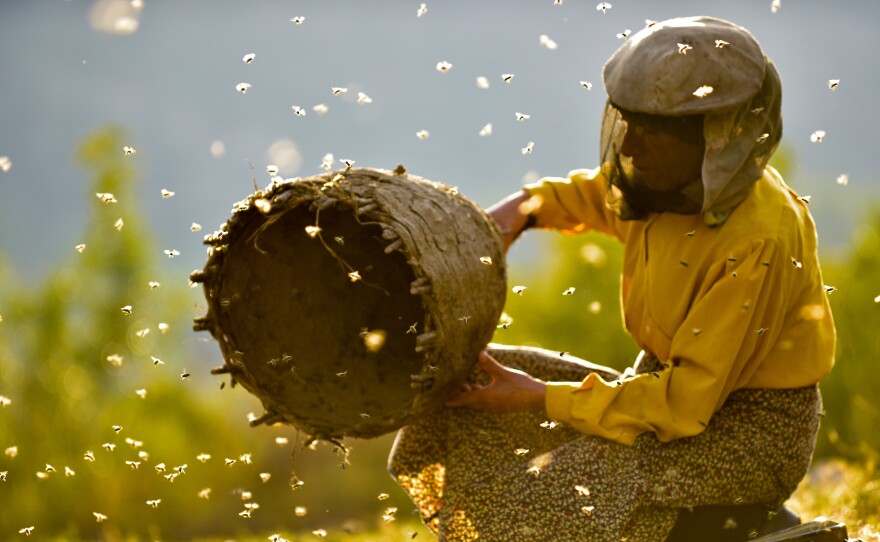I'm not sure that any creature is more marvelous than the honeybee, with its highly evolved social organization, its ability to create honey, and, of course, the stinger that causes us to take heed whenever we hear buzzing. The pain it threatens makes it easy to think you need an almost-monastic devotion to become a beekeeper.
This idea is certainly common in books and films, where keeping bees has become a metaphor for withdrawal from the world — be it Marcello Mastroianni's disaffected ex-teacher in The Beekeeper, Peter Fonda's Vietnam-vet-turned-beekeeper in Ulee's Gold, or the hero of Michael Chabon's short novel, The Final Solution, in which a retired detective who's surely Sherlock Holmes now inhabits what's called a "bee-crazed hermitage."
In real life, of course, keeping bees is a way of making a living — and not an easy one. This becomes clear in Honeyland, an exquisitely photographed documentary by Macedonian filmmakers Ljubomir Stefanov and Tamara Kotevska. Shot over three years, this elegant film — which nabbed several top prizes at Sundance — begins as the intimate portrait of a beekeeper who makes famously good honey, and then expands to become something of a parable.
The heroine is 50-something Hatidze Muratova, who lives in a tiny hut in a ruggedly mountainous area of Macedonia, 20 miles from the nearest town and seemingly hundreds of years from modernity. Hatidze spends her life looking after her argumentative mother, who can't move her legs and is going blind, and keeping bees as her family has done for generations. She works with hives high up on precarious mountain ledges and in trees hanging over the river. Her basic rule is simple: When you harvest honey, you only take half — and leave the other half for the bees.
It's a solitary, hardscrabble existence, and Hatidze doesn't enjoy being cut off from the world. Her life perks up when a migrant family moves into her barren dale along with their cattle and mobile home. Although these new neighbors are quarrelsome, she loves the companionship, especially with the kids. When the patriarch, Hussein, learns you can pick up some money from honey, she shows him the ropes of beekeeping. As you might guess, this generosity leads to trouble.
William Golding, who wrote Lord of the Flies, once said that men produce evil the way bees produce honey. And that happens here. But the evil in Honeyland is not the sort we usually see. In a Hollywood movie, Hatidze's story would be a melodrama in which her livelihood is threatened by some profit-obsessed multinational corporation involved in skullduggery.
Stefanov and Kotevska offer a more complicated truth. Hussein isn't some rich corporate thug who deliberately shatters the small, fragile ecosystem that lets Hatidze survive. He's a poor, hard-working father who struggles to support his family and is willing to cut corners producing honey to do that. Hustling and unpleasant he might be, but he's not what I'd call a bad man.
The real evil lies in the way that Hussein, like most of us, has come to see nature as a resource to be exploited. Like the impoverished farmers who burn forests in the Amazon or Indonesia, Hussein is so busy pursuing immediate gain that he doesn't understand the big picture. He doesn't care that if you don't leave behind half the honey, you wind up killing the very bees you need to keep making it.
That's why Honeyland speaks so well to our moment. Right now, the world's bees are being killed off in droves in a mysterious mass carnage known as colony collapse disorder. At the same time, huge parts of the planet are menaced by climate change. And most of the world, not least its leaders, can't be bothered to appreciate what Hatidze knows in her bones — that the ecosystems which sustain us are interconnected and surprisingly frail.
What makes her such a wonderful character isn't simply the decency and warmth revealed by her extraordinary snaggle-toothed smile. It's that Hatidze embodies a sane, respectful and engaged way of living with nature. She knows that if you want honey, you must find a way of living in harmony with the bees that create it. If you don't, you will be very badly stung.
Copyright 2019 Fresh Air. To see more, visit Fresh Air.






